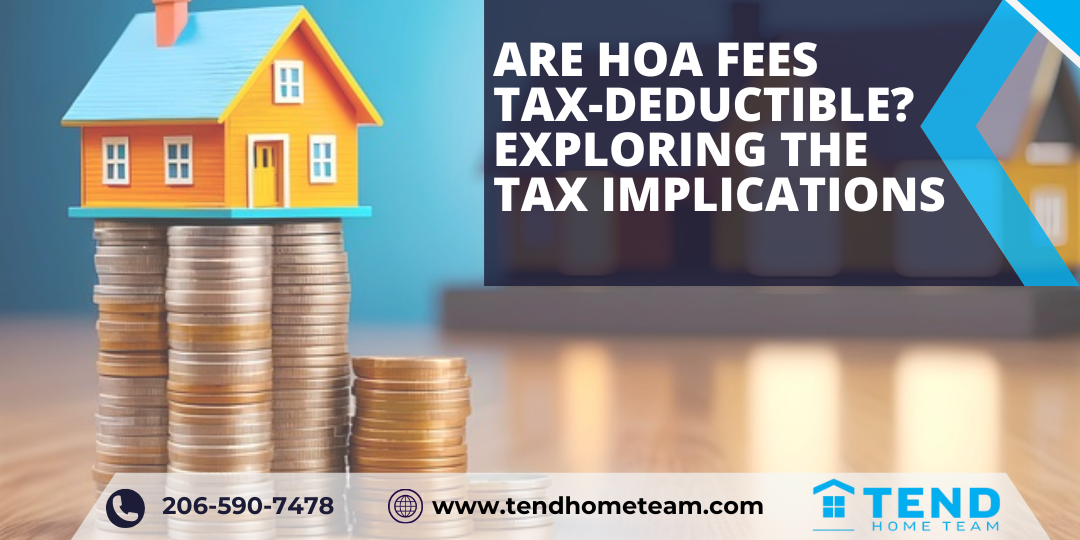Navigating the complexities of homeowners association (HOA) fees and their tax implications can be daunting for property owners. This comprehensive guide delves into whether HOA fees are tax-deductible, focusing on various homeowner scenarios under real estate commission rules and regulations in Washington State.
Understanding HOA Fees and Taxes
What are HOA Fees?
HOA fees are mandatory charges levied on property owners within a community to cover the maintenance of shared spaces and amenities such as landscaping, pools, security, and more. These fees ensure that communal areas remain functional and attractive, thereby maintaining or enhancing property values. Learn more about property management in Bellevue or surrounding housing markets in Western Washington.
Taxes and HOA Fees:
Typically, HOA fees are considered personal expenses, thus not tax-deductible when the property is used as a primary residence. However, the deductibility of these fees can vary significantly based on the property’s use, such as for rental purposes or as a home office.
How to Determine Deductibility of HOA Fees?
To determine the deductibility of HOA (Homeowners Association) fees, it’s essential to consider how the property is used. Generally, HOA fees are not deductible for personal residences. However, if you own rental property, these fees can often be deducted as a rental expense, helping reduce your taxable rental income. The IRS allows HOA fees as a business expense when the property is used specifically for rental purposes or as a home office, provided it meets the business-use criteria. Additionally, if you have a mixed-use property, where a portion is rented out, you may be able to deduct a portion of the HOA fees based on the rental-use percentage. Consulting a tax professional can provide clarity based on your situation and IRS guidelines, ensuring compliance and maximizing potential tax benefits.
HOA Fees Tax Deduction Eligibility
Determining if your HOA fees are deductible depends largely on the usage of the property:
- Primary Residence: Fees are not deductible.
- Rental Properties: Fees are considered deductible business expenses.
- Home Office: A portion of HOA fees may be deductible if a part of your home qualifies under IRS home office use guidelines.
Tax Benefits of Living in an HOA Community
Living in an HOA community doesn’t directly offer tax deductions through HOA fees for most homeowners. However, enhanced property maintenance and increased security can boost property values, which could affect property taxes and potential capital gains.
How to Claim HOA Fees on Taxes?
If applicable, such as in rental scenarios, you would claim HOA fees deduction on Schedule E of your IRS tax return, which captures income and losses from real estate.
Differences Between HOA Fees and Property Taxes
It’s crucial to differentiate between HOA fees and property taxes; property taxes are generally deductible on your returns, whereas HOA fees typically are not unless they meet specific criteria.
IRS Guidelines on HOA Fees
The IRS allows deductions for expenses deemed ordinary and necessary for generating income. For personal residences, HOA fees fail to meet this criterion, but they do for properties used for business or as rentals.
Common Misconceptions About HOA Fees and Taxes
A prevalent misconception is that all property-related expenses are deductible. However, this is incorrect for HOA fees, which are only deductible under certain business or rental use cases.
How to Maximize Deductions for Homeowners?
To maximize potential tax deductions, homeowners should consider other deductible expenses such as mortgage interest, property taxes, and home improvements focused on energy efficiency and renovations.
Reporting HOA Fees on Your Tax Return
Accurate and detailed record-keeping is crucial if you’re eligible to deduct HOA fees. Keep all receipts, invoices, and bank statements to substantiate your claims, especially during an audit.
FAQs
What does HOA cover?
HOA fees typically fund the maintenance and operation of common areas and facilities like gyms, swimming pools, security gates, landscaping, and sometimes certain utilities. Learn more about HOA fees with Tend Home Team.
How are HOAs legal?
HOAs are established under state laws and are governed by their bylaws and covenants. These documents outline the rules, regulations, and fees that apply to all residents within the community.
Why aren’t HOA fees tax deductible for homeowners?
For most homeowners, HOA fees are non-deductible because they are considered personal expenses. The IRS does not allow deductions for personal living costs.
Can you write off HOA fees on rental property?
Yes, if you own a rental property, you can deduct HOA fees as part of your rental property’s operating expenses. These deductions can lower your taxable income from rental operations.
This guide has explored the intricate tax implications of HOA fees, clarifying when these fees can and cannot be deducted. Homeowners are encouraged to consult with tax professionals to fully understand these rules and apply them correctly based on their specific circumstances. By doing so, you can ensure compliance with IRS regulations and potentially optimize your tax outcomes. Contact Tend Home Team today to inquire more about HOA fees, or explore properties in Bellevue, WA and surrounding areas.


